Composite insulators, used mainly in power transmission and distribution, are made of a fiberglass core, silicone rubber housing, and metal end fittings. This structure makes them lightweight, strong, and suitable for harsh environments.
Definition
A composite insulator, or polymer insulator, is a non-conductive component that mechanically supports and electrically isolates high-voltage lines, preventing current leakage even in tough conditions like salt spray, rain, or industrial pollution.
Basic Structure
Composite insulators have three main parts:
Lightweight: Up to 90% lighter than porcelain, easier to transport and install, especially in remote or elevated areas.
High Mechanical Strength: The FRP core offers excellent tensile performance, resisting wind, tension, and ice loading, with a superior strength-to-weight ratio.
Self-Cleaning Hydrophobic Sheath: Silicone rubber repels water, forming droplets instead of conductive films, reducing leakage currents and maintenance needs in polluted regions.
Safer Failure Mode: Unlike brittle ceramic or glass, composites don’t shatter, reducing injury and system fault risks.
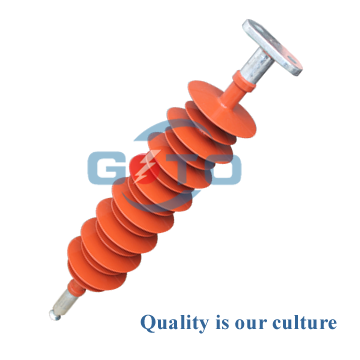
Long-Term Resistance: Withstand intense sunlight, acid rain, industrial fumes, and coastal salt spray, offering up to 30 years of service.
Hydrophobicity Recovery: Silicone rubber can regain hydrophobicity after ageing or contamination, ensuring sustained insulation and minimising maintenance.
Environmental Suitability: High thermal stability, corrosion resistance, and mechanical resilience make them reliable in deserts, alpine zones, coastal areas, and high-humidity environments. Their long life and low upkeep are ideal for utilities seeking efficiency and safety.
The Indian composite insulator market has experienced robust and sustained growth over recent years, driven by increasing electricity demand, large-scale investments in transmission infrastructure, and the country’s transition toward smart grid systems. As power reliability becomes a national priority, the demand for high-quality insulators from trusted composite insulator manufacturers continues to rise.
According to recent reports, India’s electric insulator market was valued at USD 453.6 million in 2024, with composite insulators accounting for a growing share of this figure. From 2018 to 2023, the composite insulator segment grew at an estimated CAGR of 7–8%, outperforming traditional insulator types thanks to its lightweight structure, pollution resistance, and long-term reliability in harsh environments.
India is also a major global importer of composite insulators, ranking second in the world with over 8,263 shipments in 2023, accounting for 22% of global import market share. Most imports come from countries like China, Germany, and Italy, though an increasing number of domestic composite insulator manufacturers in India are now gaining international recognition for their product quality and innovation.
The future of India’s composite insulator sector looks strong. Backed by the National Electricity Plan, the country plans to invest over USD 111 billion into upgrading its power transmission systems, expanding network capacity from 4.85 lakh ckm to 6.48 lakh ckm, and increasing transformation capacity to 2,342 GVA to meet peak power demands of 458 GW.
By 2032, India’s overall electric insulator market is projected to surpass USD 750 million, with composite insulators projected to make up 40–50% of the total market—translating to an estimated USD 300–375 million. This surge in demand offers significant growth opportunities for both local and international composite insulator manufacturers operating in the region..
| Company | Founded | Products | Certification |
| GOTO Electrical | 2013 | Composite Insulators, Lightning Arresters, Arrester Fittings, Fuse Cutout | ISO 9001、ISO 14001、OHSAS 18001 |
| Aditya Birla Insulators (ABI) | 1967 | High-Performance Porcelain, Composite Insulators For Transmission Lines, Substations, Power Equipment | ISO 9001, ISO 14001, SA 8000 |
| Modern Insulators Ltd. (MIL) | 1985 | Porcelain insulators | ISO 14001, ISO 18001 |
| Insulators and Electricals Company (IEC) | 1981 | Porcelain insulators | ISO 9001, ISO 14001, ISO 18001 |
| Stork Rubber | 1995 | Silicone rubber and polymer insulators | ISO 14001, ISO 18001 |
| Yamuna Power & Infrastructure Ltd | 1973 | Power Cable Accessories, Heat Shrink Products, And Insulators | SO 9001, ISO 14001, OHSAS 18001 |
| Rashtriya Electrical and Engineering Corporation | 1980 | Power And Distribution Transformers. | ISO 9001 |
| Shree Radhe Industries Industries | 2000 | Electrical Fittings And Insulators | ISO 9001 |
| Geo Industries | 2005 | Power Hardware And Insulators | ISO 9001 |
| Spark Insulators Pvt. Ltd | 2010 | Ceramic And Composite Insulators | ISO 9001 |
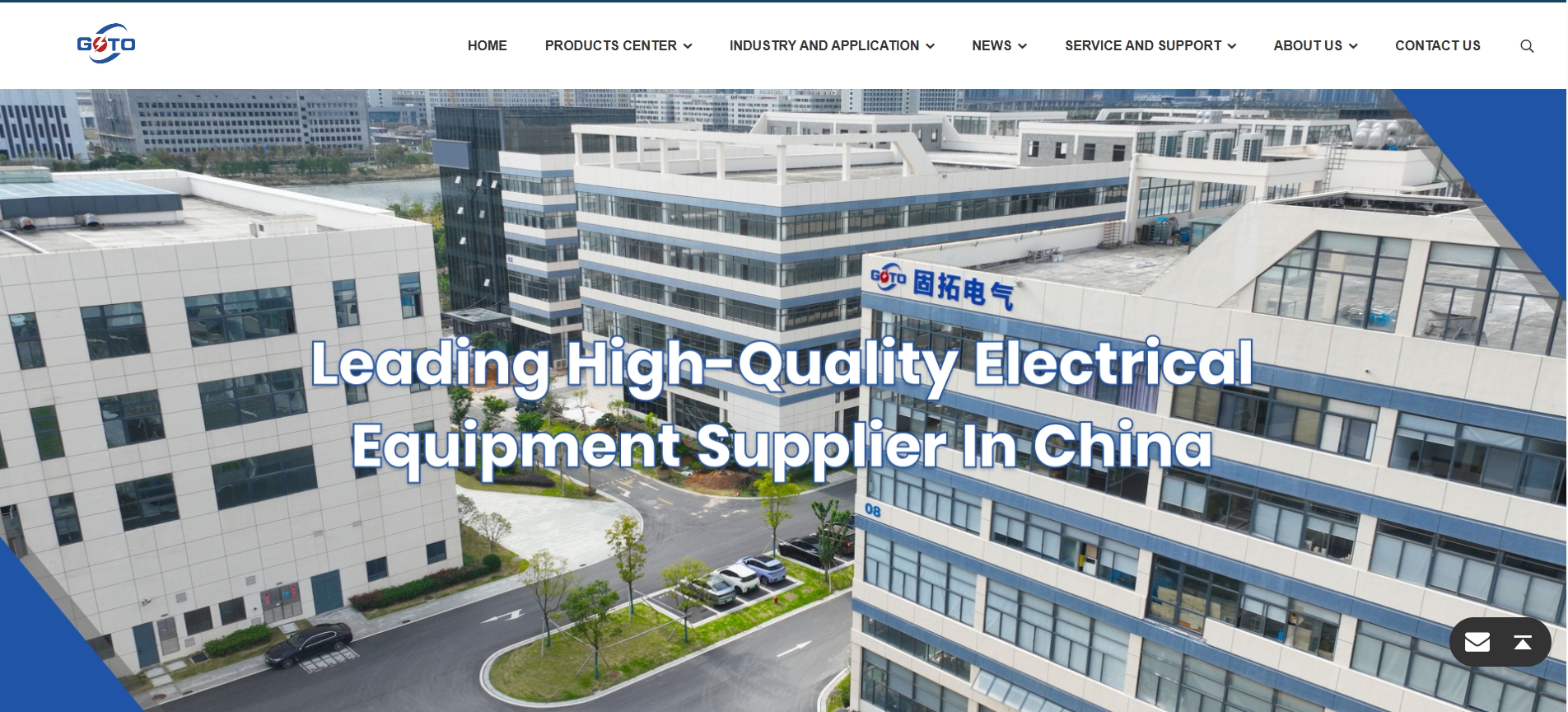
GOTO Electrical Composite Insulator Manufacturers
GOTO Electrical Co., Ltd. specializes in manufacturing high-quality electrical equipment, focusing on lightning protection and power transmission solutions. With over 11 years of experience, a 1,500㎡ production facility, and a team of 100+ employees, the company generates an annual revenue of $600M. GOTO Electrical adheres to strict industry standards and holds certifications including ISO 9001, ISO 14001, OHSAS 18001, and CNAS product testing reports, ensuring reliable and high-performance products.
Composite Insulators
Auto Reclosers
Surge Arresters
Fuses
Disconnect Switches
Line Lightning Protection
Cable Accessories
Through wall Bushing
Line Fittings
Power Transmission & Distribution
Railway Electrification
Renewable Energy
Industrial Power Systems
101-2, Building 8, Robot Industrial Park,No.176 Yanyun Road, Lingkun Street Zhejiang Province, China

Aditya Birla Insulators is India’s largest electrical insulator manufacturer and ranks among the top four globally. The company provides a complete range of insulator solutions, from 11kV to 1200kV, widely used in transmission lines, substations, and railway electrification projects.
Porcelain Insulators
Composite Insulators
Railway Electrification Insulators
Substation Insulators
Power Transmission & Distribution
Railway Electrification
Heavy Industry & Infrastructure
Aditya Birla Centre, S.K. Ahire Marg, Worli, Mumbai – 400030, India
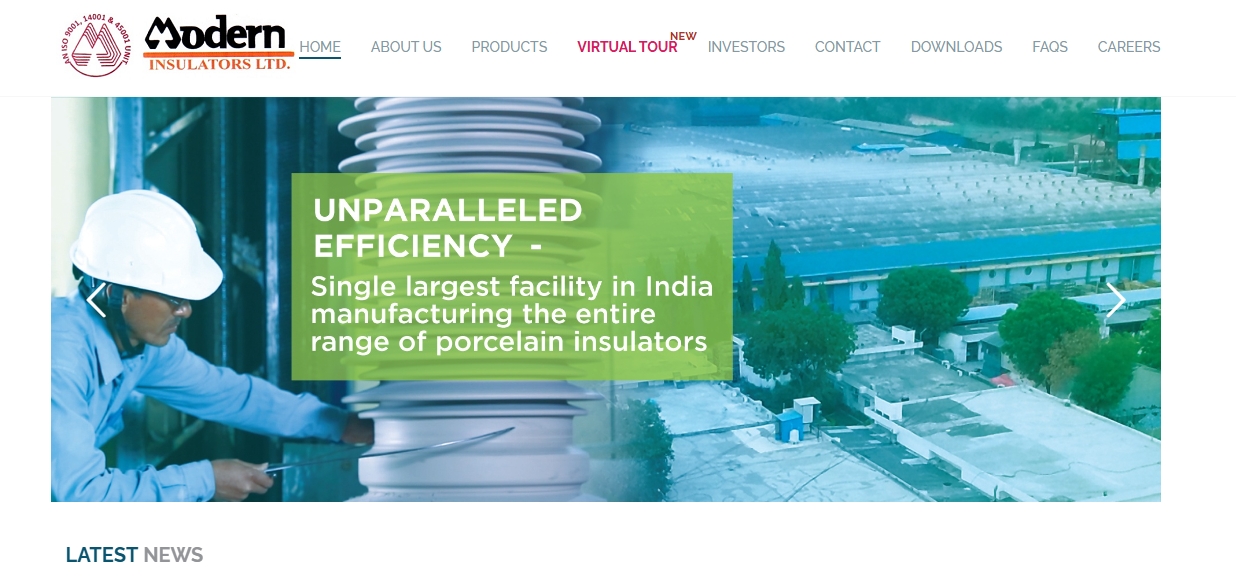
Established in 1985 in collaboration with Siemens, Germany, Modern Insulators Ltd. (MIL) is one of India’s leading porcelain insulator manufacturers. The company exports to over 50 countries and provides high-voltage insulators ranging from 11kV to 800kV+.
Hollow Porcelain Insulators
Long Rod Insulators
Porcelain Suspension Insulators
Railway Electrification Insulators
Power Transmission & Distribution
Railway Electrification
Industrial Equipment Manufacturing
Post Box No. 9, Abu Road, Rajasthan – 307026, India
Established in 2017, Insulators and Electricals Company (IEC) is a rapidly growing manufacturer of high-quality electrical insulators in India. Partnering with RWI, Germany, and Tata Consultancy Services, IEC has quickly built a reputation for innovation and reliability in the insulator industry. With a strong focus on R&D and advanced manufacturing capabilities, the company produces high-tensile porcelain insulators and various pin-type insulators designed for durability and efficiency. IEC serves both domestic and international markets, exporting to over 41 countries worldwide.
Low Tension Transformer Bushings
Post Insulator Fittings
Solid Core Insulators
Substation Electro Porcelain Insulators
Corner Insulators
Transformer Bushings
Insulator Inserts
Pin-Type Insulators
Power Transmission & Distribution
Railway Electrification
Industrial & Commercial Electrical Infrastructure
1-8 New Industrial Area, PB Bo. 1, Mandideep – 462 046 (M.P) India
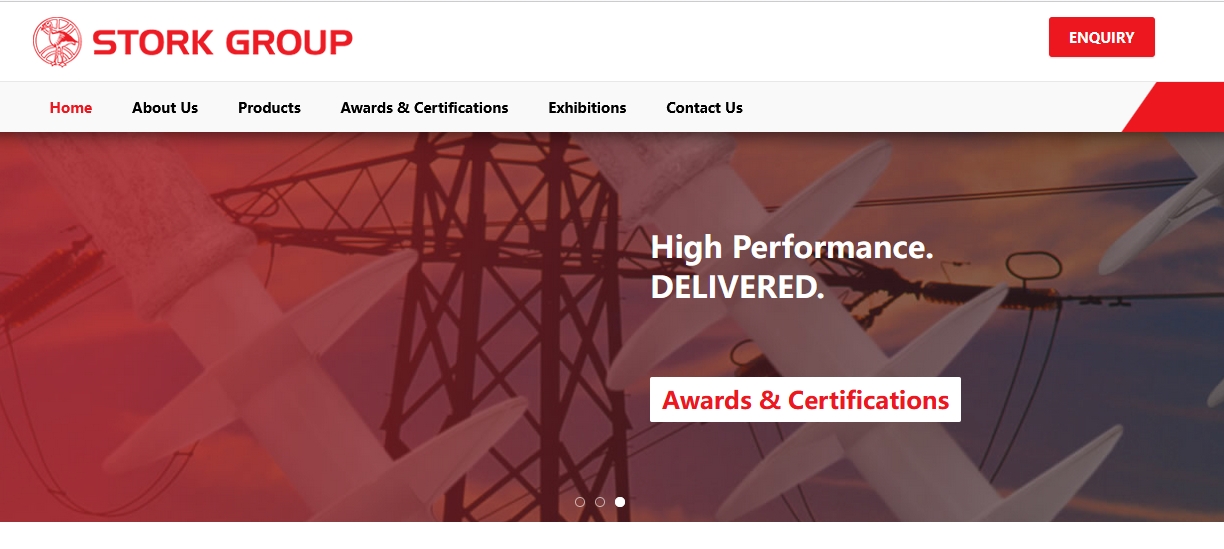
Stork Rubber Products Private Limited is an Indian manufacturer specializing in rubber components, polymer insulators, and automotive control cables. Established in 1995, the company has expanded its global reach, exporting to over 30 countries and serving as an OEM supplier to numerous domestic and international automobile and motorcycle manufacturers. With manufacturing facilities in Gurgaon, Sitarganj, and Chennai, Stork Rubber is known for its commitment to quality, innovation, and industrial reliability.
cria.org.cn
Rubber Components
Rubber-to-Metal Bonded Parts
Automotive Control Cables
High-Voltage Polymer Insulators (11kV – 400kV)
Power Transmission & Distribution
Automotive Manufacturing
Industrial Equipment & Machinery
Renewable Energy & Smart Grids
Commercial & Heavy-Duty Vehicles
Head Office & Manufacturing Facility: Stork Rubber Products Pvt. Ltd. Plot No. 288, Sector 6, IMT Manesar, Gurgaon, Haryana, India – 122050
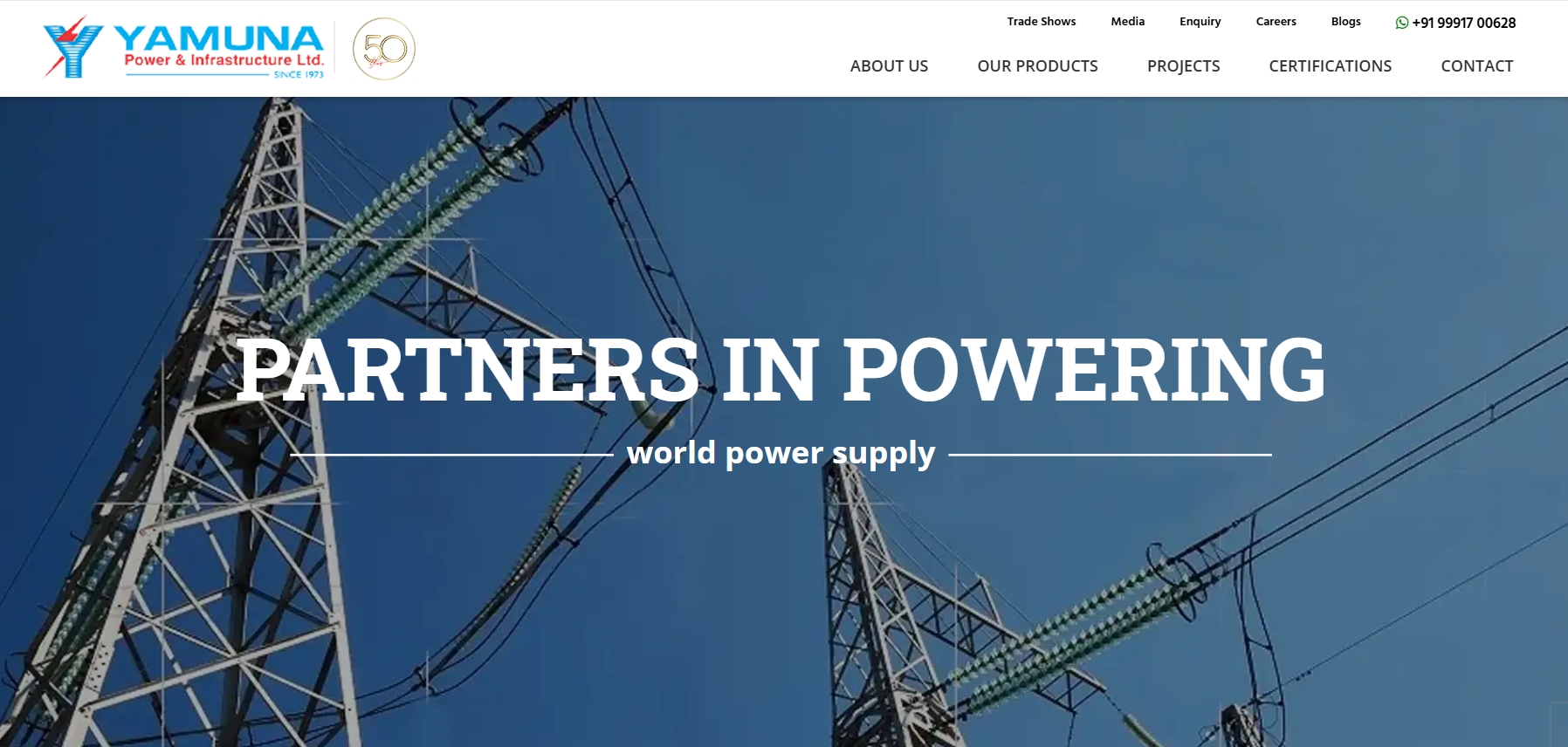
Founded in 1973, Yamuna Power & Infrastructure Ltd. is a leading manufacturer of cable accessories, power grid equipment, and composite insulators. The company exports to over 35 countries and plays a crucial role in the global power transmission and distribution industry.
Composite Polymer Insulators (11kV – 765kV)
Cable Termination & Jointing Accessories
Vacuum Circuit Breakers
Control & Relay Panels
Power Transmission & Distribution
Substation Equipment
Renewable Energy
3rd Floor, 16, Pusa Road, New Delhi – 110005, India
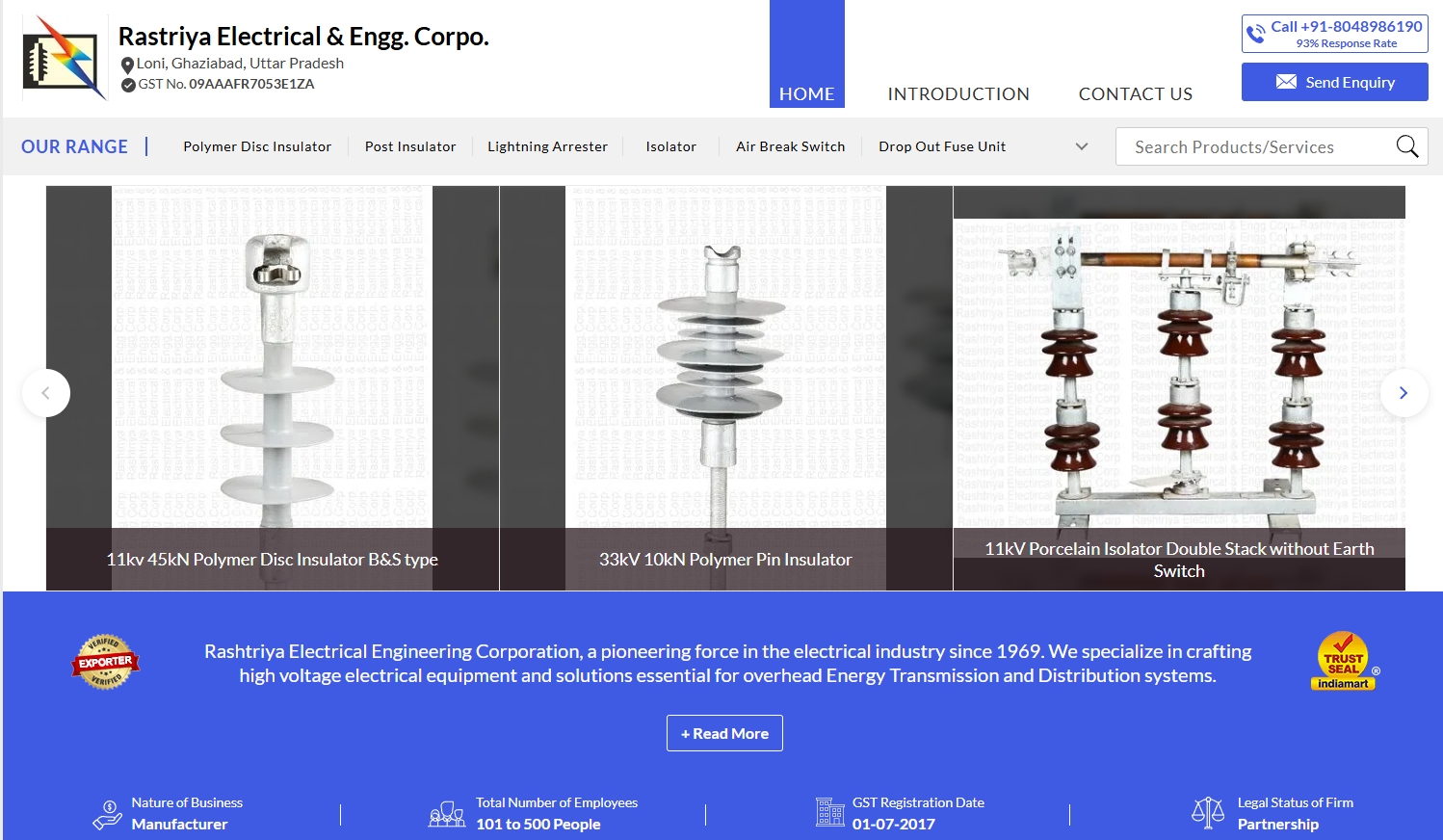
Rashtriya Electrical and Engineering Corporation is a leading Indian supplier of electrical equipment, specializing in power transformers, transmission & distribution systems, and high-voltage switchgear. The company is dedicated to providing durable and high-efficiency products.
Transformer Insulation Components
Power Cable Accessories
High-Voltage Switchgear
Insulators & Support Structures
Power Transmission & Distribution
Railway Electrification
Renewable Energy
HRastriya Electrical & Engg. Corpo.C-2-3, Sector A-3 Tronica City Loni, Ghaziabad .201102, Uttar Pradesh, India
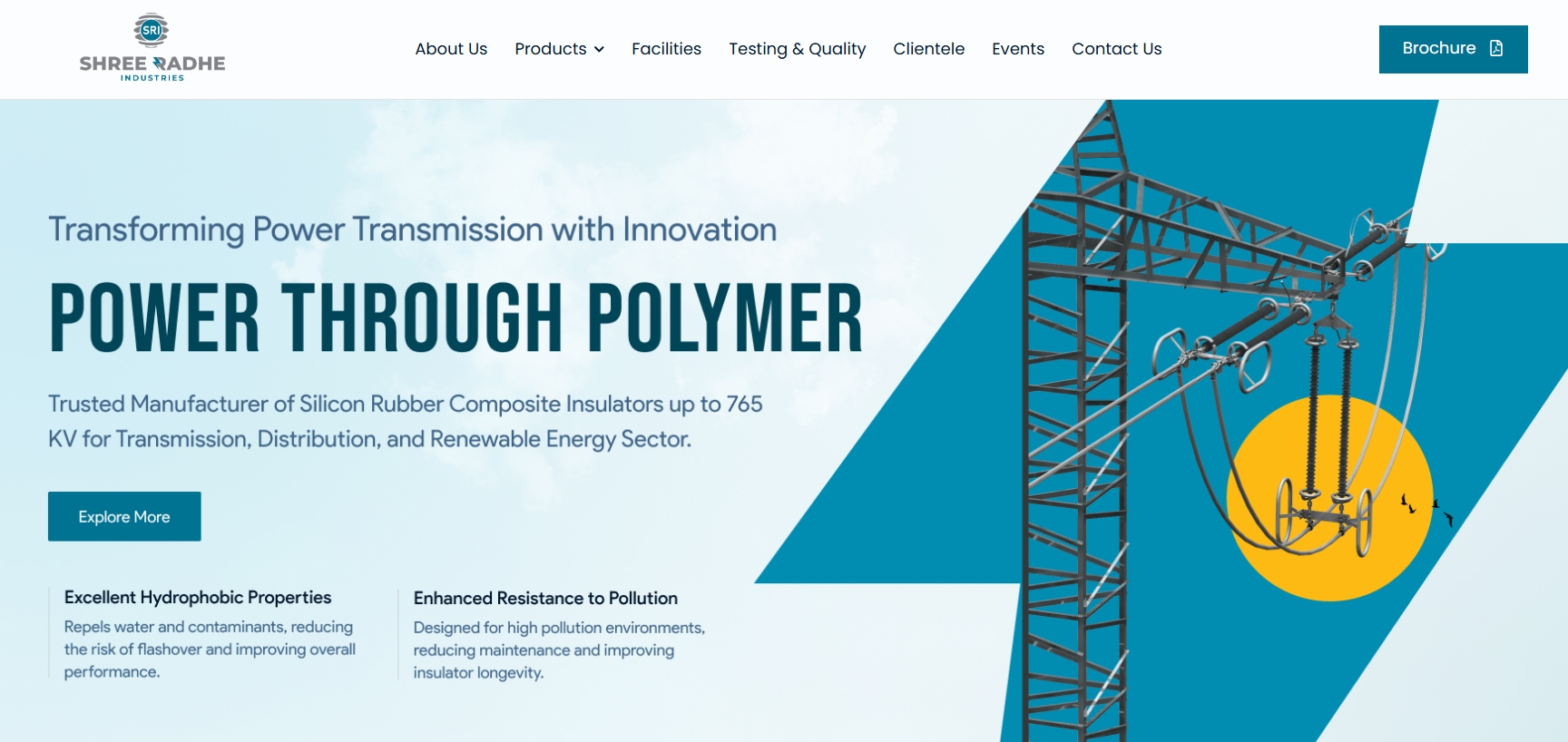
Shree Radhe Industries, based in Gujarat, India, specializes in high-performance insulators for voltage levels ranging from 11kV to 765kV. The company is known for its high-quality composite insulators and medium-to-high voltage transmission and distribution solutions.
Long Rod Insulators
Disc Suspension Insulators
Substation Post Insulators
High-Voltage Surge Arresters
Power Transmission & Distribution
Substation & Electrical Infrastructure
Renewable Energy
Plot No. 86, GIDC Alindra, District Vadodara-391775 Savli, Gujarat, india.
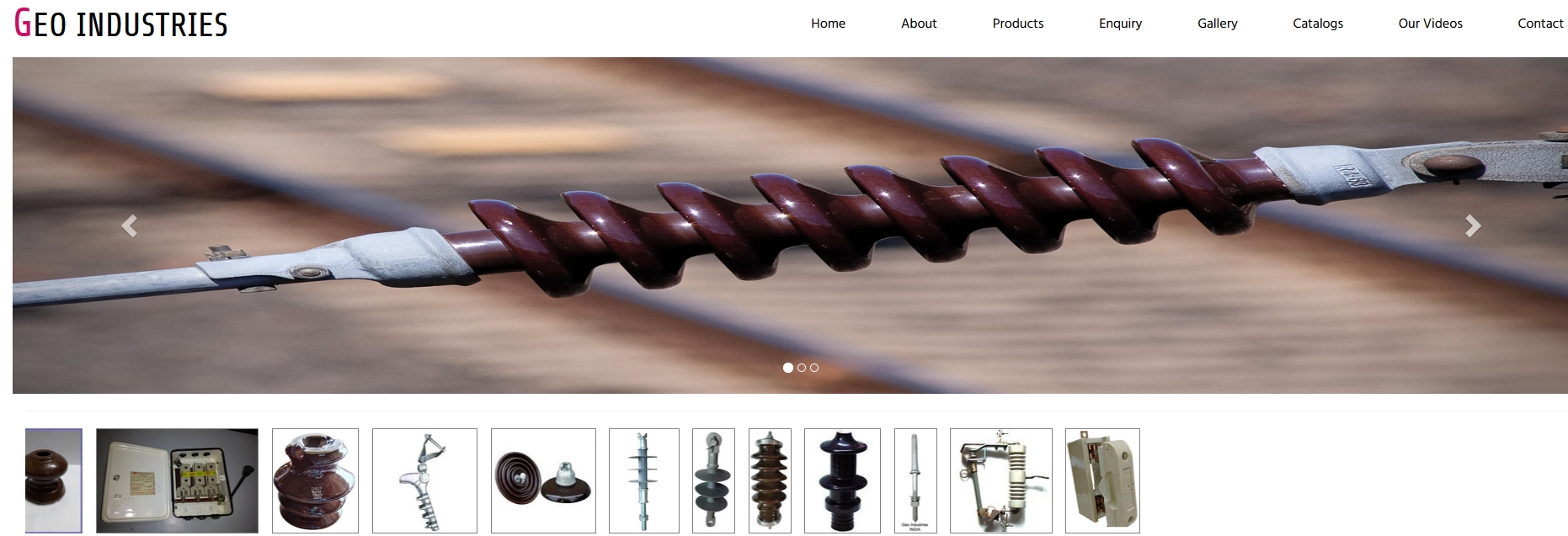
India Insulator is a specialized manufacturer of high-voltage and extra-high-voltage power insulators, serving both domestic and international power grids and industrial clients. The company adheres to international standards such as IEC and ANSI.
Substation Insulators
Composite Suspension Insulators
Transformer Bushing Insulators
High-Voltage Insulation Accessories
Power Transmission & Distribution
Railway Electrification
Industrial Equipment Manufacturing
Opp.Industrial Area,GT Road,Khurja-203131
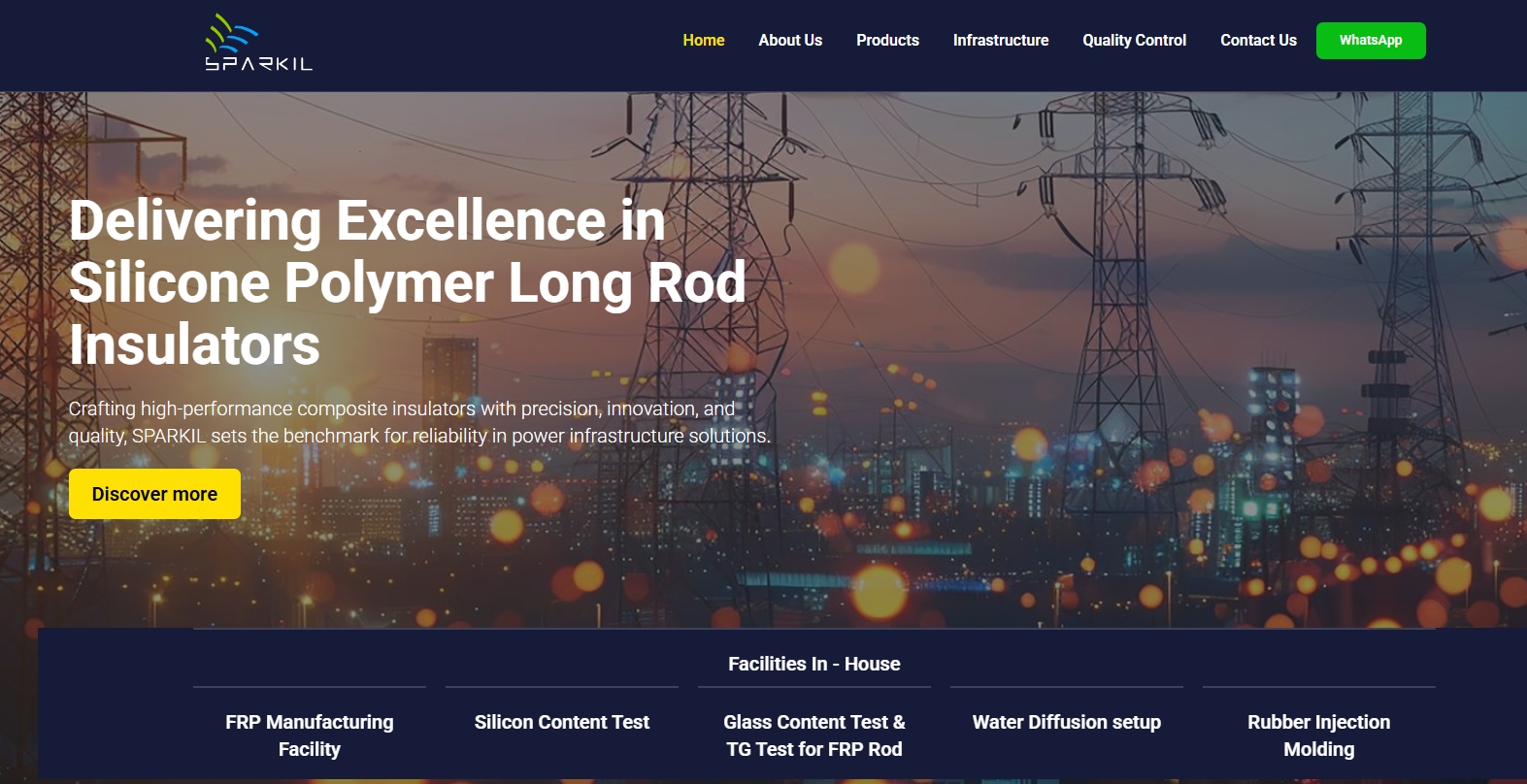
Spark Insulators Pvt Ltd (SPARKIL), founded in 2009, is a leading Indian manufacturer of composite polymer insulators, offering solutions for voltage levels ranging from 11kV to 765kV. The company focuses on innovation and strict quality control to meet global standards.
Composite Silicone Rubber Insulators
Disc Insulators
Post Insulators
Substation Insulators
Power Transmission & Distribution
Industrial Power Systems
Renewable Energy
HPlot no: 1/A/1, Phase -l, lDA, Cherlapally.
Hyderabad -500 051, Telangana.INDlA.
Choosing a supplier with a strong track record for quality ensures long-term performance and safety in electrical applications. Look for insulators with high mechanical strength, thermal stability, and resistance to environmental factors.
Certifications play a crucial role in verifying a manufacturer’s commitment to quality, safety, and environmental responsibility:
Selecting an insulator manufacturer with these certifications assures compliance with global quality standards, environmental protection, and workplace safety, making it a crucial factor in supplier evaluation.
A manufacturer’s production capability affects lead times and scalability. Evaluate their production facilities, automation level, and ability to meet bulk orders without compromising quality.
While cost is a critical factor, balancing affordability with quality is essential. Compare suppliers based on total cost of ownership, including durability, maintenance, and replacement cycles.
India’s electrical insulator market is dynamic and highly competitive, with top manufacturers delivering premium solutions for both domestic and global markets. These companies offer a comprehensive range of insulators—including porcelain, composite, and polymer options—all compliant with industry standards and designed for optimal performance.
When selecting a manufacturer, material quality, voltage compatibility, and supplier credibility are crucial factors. The right choice ensures long-term system reliability, safety, and operational efficiency in electrical transmission and distribution infrastructure.
Q: What are the different types of electrical insulators?
A: Electrical insulators include pin insulators, suspension insulators, strain insulators, shackle insulators, and post insulators, each serving specific functions in electrical systems.
Q: Which is better: porcelain or polymer insulators?
A: Choosing between porcelain and composite insulators depends on your project’s mechanical, environmental, and budget requirements. Here’s a side-by-side comparison to help you make the right decision.
| Feature | Porcelain Insulator | Composite Insulator (Polymer Insulator) |
| Material Composition | Made from ceramic materials | Fiberglass rod core with silicone rubber housing |
| Weight | Heavy and bulky | Lightweight, up to 90% lighter |
| Mechanical Strength | High, but brittle under impact | High tensile strength with flexible failure mode |
| Pollution Resistance | Susceptible to surface contamination | Excellent performance in polluted or coastal environments |
| Hydrophobic Properties | Limited, may form water films | Self-cleaning hydrophobic silicone surface |
| Installation | Requires cranes or more labour | Easier and faster to install, even in remote areas |
| Aging and UV Resistance | Long lifespan but may degrade in acidic or wet conditions | UV-resistant, recovers hydrophobicity after aging |
| Failure Mode | May shatter explosively | Safe failure without shattering |
| Maintenance Needs | Periodic cleaning required | Low maintenance due to self-cleaning properties |
| Application Suitability | Traditional substations, low-cost replacements | Modern power lines, smart grids, polluted zones |